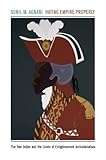Hating Empire Properly : The Two Indies and the Limits of Enlightenment Anticolonialism / Sunil M. Agnani.
Material type: TextPublisher: New York, NY : Fordham University Press, [2013]Copyright date: ©2013Description: 1 online resource (320 p.)Content type:
TextPublisher: New York, NY : Fordham University Press, [2013]Copyright date: ©2013Description: 1 online resource (320 p.)Content type: - 9780823251803
- 9780823252169
- 325/.3 23
- JC359 .A55 2013
- online - DeGruyter
| Item type | Current library | Call number | URL | Status | Notes | Barcode | |
|---|---|---|---|---|---|---|---|
 eBook
eBook
|
Biblioteca "Angelicum" Pont. Univ. S.Tommaso d'Aquino Nuvola online | online - DeGruyter (Browse shelf(Opens below)) | Online access | Not for loan (Accesso limitato) | Accesso per gli utenti autorizzati / Access for authorized users | (dgr)9780823252169 |
Browsing Biblioteca "Angelicum" Pont. Univ. S.Tommaso d'Aquino shelves, Shelving location: Nuvola online Close shelf browser (Hides shelf browser)

|

|

|

|

|

|

|
||
| online - DeGruyter Orthodox Constructions of the West / | online - DeGruyter Veiled Desires : Intimate Portrayals of Nuns in Postwar Anglo-American Film / | online - DeGruyter After Translation : The Transfer and Circulation of Modern Poetics Across the Atlantic / | online - DeGruyter Hating Empire Properly : The Two Indies and the Limits of Enlightenment Anticolonialism / | online - DeGruyter Hollow Men : Writing, Objects, and Public Image in Renaissance Italy / | online - DeGruyter Motherhood as Metaphor : Engendering Interreligious Dialogue / | online - DeGruyter Sovereignty and Its Other : Toward the Dejustification of Violence / |
Frontmatter -- Contents -- List of Illustrations -- Acknowledgments -- Prologue: Enlightenment, Colonialism, Modernity -- Introduction: Companies, Colonies, and Their Critics -- PART I Denis Diderot: The Two Indies of the French Enlightenment -- 1 Doux Commerce, Douce Colonisation: Consensual Colonialism in Diderot’s Thought -- 2 On the Use and Abuse of Anger for Life: Ressentiment and Revenge in the Histoire des deux Indes -- PART II Edmund Burke: Political Analogy and Enlightenment Critique -- 3 Between France and India in 1790: Custom and Arithmetic Reason in a Country of Conquest -- 4 Jacobinism in India, Indianism in English Parliament: Fearing the Enlightenment and Colonial Modernity -- 5 Atlantic Revolutions and Their Indian Echoes: The Place of America in Burke’s Asia Writings -- Epilogue. Hating Empire Properly: European Anticolonialism at Its Limit -- Notes -- Bibliography -- Index
restricted access online access with authorization star
http://purl.org/coar/access_right/c_16ec
In Hating Empire Properly, Sunil Agnani produces a novel attempt to think the eighteenth-century imagination ofthe West and East Indies together, arguing that this is how contemporary thinkers Edmund Burke and DenisDiderot actually viewed them. This concern with multiple geographical spaces is revealed to be a largelyunacknowledged part of the matrix of Enlightenment thought in which eighteenth-century European and American self-conceptions evolved. By focusing on colonial spaces of the Enlightenment, especially India and Haiti, he demonstrates how Burke's fearful view of the French Revolution—the defining event of modernity— as shaped by prior reflection on these other domains. Exploring with sympathy the angry outbursts against injustice in the writings of Diderot, he nonetheless challenges recent understandings of him as a univocal critic of empire by showing the persistence of a fantasy of consensual colonialism in his thought. By looking at the impasses and limits in the thought of both radical and conservative writers, Agnani asks what it means to critique empire “properly.” Drawing his method from Theodor Adorno’s quip that “one must have tradition in oneself, in order to hate it properly,” he proposes a critical inhabiting of dominant forms of reason as a way forward for the critique of both empire and Enlightenment.Thus, this volume makes important contributions to political theory, history, literary studies, American studies, and postcolonial studies.
Mode of access: Internet via World Wide Web.
In English.
Description based on online resource; title from PDF title page (publisher's Web site, viewed 03. Jan 2023)


